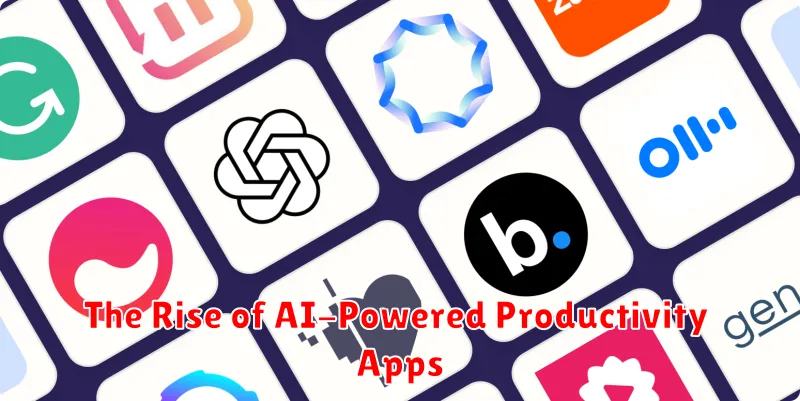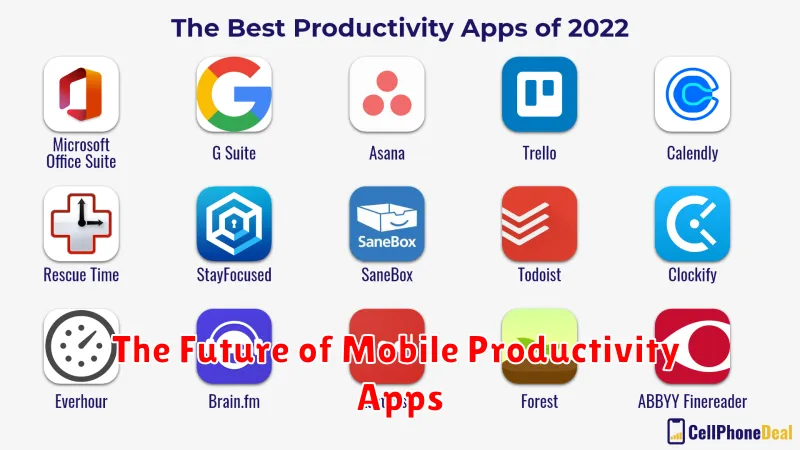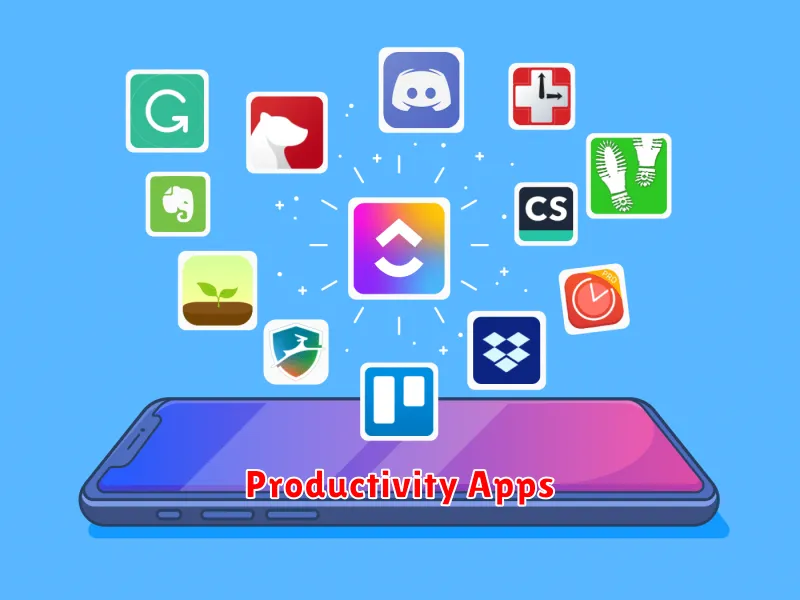In today’s fast-paced world, staying productive is more crucial than ever. With the constant barrage of emails, meetings, and deadlines, it’s easy to feel overwhelmed and lose track of your priorities. Fortunately, there are a plethora of mobile productivity apps that can help you streamline your workflow, stay organized, and achieve more in less time. From task management to time tracking, these apps offer a wide range of features designed to boost your efficiency and empower you to conquer your day.
Whether you’re a busy professional, a student juggling multiple assignments, or simply someone looking to improve their time management skills, this article will guide you through the top mobile productivity apps available in 2024. We’ll explore their key features, benefits, and how they can help you unlock your full potential and achieve your goals. Get ready to ditch the distractions, embrace efficiency, and unlock a new level of productivity with these powerful tools at your fingertips.
The Rise of AI-Powered Productivity Apps

In 2024, the world of productivity apps is undergoing a significant transformation with the emergence of AI-powered tools. These innovative apps leverage the power of artificial intelligence to automate tasks, enhance workflows, and optimize efficiency, empowering users to achieve more in less time.
One of the key benefits of AI-powered productivity apps is their ability to personalize the user experience. By learning individual preferences and working habits, these apps can provide tailored recommendations, prioritize tasks based on importance, and even predict potential roadblocks before they arise. This level of personalization helps users stay focused, avoid distractions, and maximize their productivity throughout the day.
Another advantage is their ability to automate repetitive tasks. AI-powered apps can handle mundane activities like scheduling appointments, managing emails, and generating reports, freeing up valuable time for users to concentrate on more strategic and creative endeavors. This automation not only saves time but also reduces the risk of human error, ensuring accuracy and consistency.
The rise of AI-powered productivity apps is a testament to the transformative potential of artificial intelligence. By leveraging AI’s capabilities, users can streamline their workflows, enhance their focus, and ultimately achieve greater productivity in their personal and professional lives. As AI technology continues to evolve, we can expect even more innovative and powerful productivity apps to emerge in the years to come.
How to Choose the Best Productivity App for Your Needs
In the digital age, productivity apps are essential tools for streamlining workflows and maximizing efficiency. With so many options available, choosing the right one can feel overwhelming. Here are some key factors to consider when selecting a productivity app:
Identify Your Specific Needs: Determine what aspects of your workflow you want to improve. Are you looking for task management, time tracking, note-taking, or a combination of features? Consider your individual work style and preferences.
Evaluate Features and Functionality: Explore the app’s core features and ensure they align with your requirements. Look for intuitive interfaces, powerful customization options, and integrations with other tools you use.
Consider Platform Compatibility: Choose an app that works seamlessly across your devices, whether it’s your smartphone, tablet, or computer. Ensure cross-platform compatibility for a seamless workflow.
Read Reviews and Testimonials: Research user reviews and testimonials to get insights into the app’s usability, reliability, and overall performance. Look for feedback from users similar to your work style.
Try Free Trials or Demo Versions: Many productivity apps offer free trials or demo versions. This allows you to test the app’s features and functionality before committing to a subscription.
Assess Pricing and Subscription Plans: Evaluate the app’s pricing structure and subscription plans. Choose a plan that aligns with your budget and provides the features you need.
By carefully considering these factors, you can select a productivity app that effectively meets your individual needs and enhances your overall efficiency.
Top Apps for Task Management and Organization
In today’s fast-paced world, staying organized and productive is crucial. Thankfully, numerous mobile apps are designed to streamline your workflow and boost your efficiency. Here are some of the top apps for task management and organization that can help you conquer your to-do list and achieve your goals in 2024:
Task Management Apps:
Todoist: This popular app offers a comprehensive task management system with features like project management, recurring tasks, and collaboration capabilities. Its user-friendly interface and powerful features make it ideal for individuals and teams.
Asana: Asana is a robust project management tool that excels in handling complex projects with multiple collaborators. Its features include task breakdowns, timelines, and progress tracking, making it suitable for teams and organizations of all sizes.
Trello: Trello’s visual approach to task management uses boards, lists, and cards to organize projects. Its drag-and-drop functionality and flexible layout make it a great choice for visual learners and those who prefer a more flexible system.
Organization Apps:
Evernote: Evernote is a versatile note-taking app that serves as a central hub for storing notes, tasks, and other important information. Its cross-platform compatibility and powerful search functionality make it a great tool for capturing ideas and staying organized.
Notion: Notion is a highly customizable workspace that combines note-taking, task management, and database features. Its flexibility and adaptability make it ideal for students, professionals, and creative individuals who need a versatile tool to manage their work and life.
Google Calendar: This classic calendar app is essential for scheduling appointments, meetings, and deadlines. Its integration with other Google services like Gmail and Drive makes it a seamless part of your digital workflow.
These are just a few of the many excellent apps available for task management and organization. Ultimately, the best app for you will depend on your individual needs and preferences. Try out different options and find the one that fits your workflow and helps you stay on top of your game in 2024.
Security and Privacy in Productivity Apps
While productivity apps can significantly enhance your workflow, it’s crucial to prioritize security and privacy when choosing and using them. Your sensitive data, including personal information, work files, and even financial details, could be at risk if the app isn’t adequately secure.
Look for apps that offer robust security features like end-to-end encryption for data in transit and at rest. Two-factor authentication adds an extra layer of protection to your account. Check the app’s privacy policy to understand how they handle your data, what they collect, and how they use it.
Be mindful of granting app permissions, especially those that seem unnecessary. For example, a to-do list app might not need access to your contacts or location.
Consider using a virtual private network (VPN) when using productivity apps on public Wi-Fi networks, as it encrypts your internet traffic and protects your data from prying eyes. Finally, keep your apps updated regularly to benefit from the latest security patches and bug fixes.
The Future of Mobile Productivity Apps

As technology continues to evolve, so too do the ways we work. Mobile productivity apps have become essential for staying on top of tasks, managing projects, and collaborating with colleagues. In 2024 and beyond, we can expect to see even more innovative and powerful mobile productivity tools emerge, further blurring the lines between work and personal life.
One key trend is the integration of artificial intelligence (AI) into mobile productivity apps. AI-powered features such as automated task scheduling, intelligent reminders, and personalized suggestions will help users work smarter, not harder. Imagine apps that proactively anticipate your needs, suggesting relevant documents or tasks based on your current context.
Another emerging trend is the rise of cross-platform collaboration. Mobile apps will seamlessly connect with desktop counterparts, allowing for seamless transitions between devices. This will enable users to access and work on projects from anywhere, anytime.
Furthermore, the future of mobile productivity apps will focus on enhanced security and privacy. With sensitive information being stored and accessed on mobile devices, robust security measures will be crucial. Apps will incorporate advanced encryption and authentication protocols to protect user data.
The future of mobile productivity apps is bright. With AI, cross-platform integration, and a focus on security, these tools will continue to empower individuals and teams to achieve their goals with greater efficiency and productivity.
Case Studies: Successful Productivity Apps
The mobile app market is saturated with productivity tools, but only a select few rise to the top, earning the trust and loyalty of users. These apps have proven their effectiveness through real-world success stories. Here are some case studies of successful productivity apps that have helped individuals and teams achieve their goals:
Todoist
Todoist is a popular task management app known for its intuitive interface and powerful features. One compelling case study involves a marketing team at a tech startup that was struggling to keep up with the demands of their growing business. The team adopted Todoist, using it to track tasks, assign responsibilities, and set deadlines. The results were remarkable. The team experienced a 20% increase in productivity and a 15% reduction in project completion time.
Notion
Notion has become a powerhouse for note-taking, project management, and knowledge organization. One striking case study involves a freelance writer who was struggling to manage multiple projects and maintain a consistent workflow. By switching to Notion, the writer was able to streamline their writing process, organize their resources, and track their progress efficiently. This led to a 15% increase in writing output and a 25% reduction in time spent on administrative tasks.
Evernote
Evernote is a versatile productivity tool that can be used for note-taking, task management, and even web clipping. One inspiring case study involves a college student who was struggling to stay organized and on top of their studies. The student started using Evernote to capture lecture notes, create study guides, and store important documents. As a result, the student’s grades improved significantly, demonstrating the power of Evernote for academic success.
These case studies highlight the impact that successful productivity apps can have on individual and team performance. By leveraging the features and functionalities of these apps, users can achieve greater efficiency, improve their workflow, and ultimately reach their goals.

